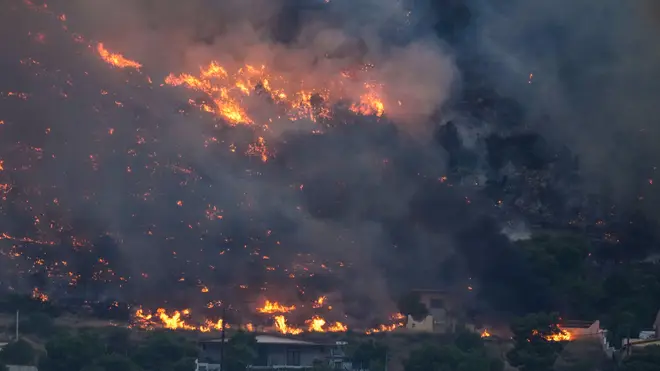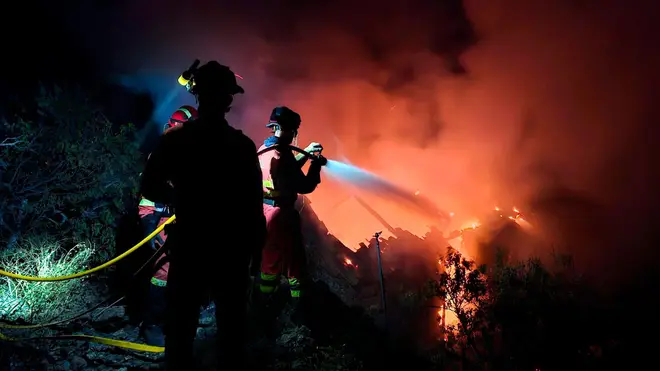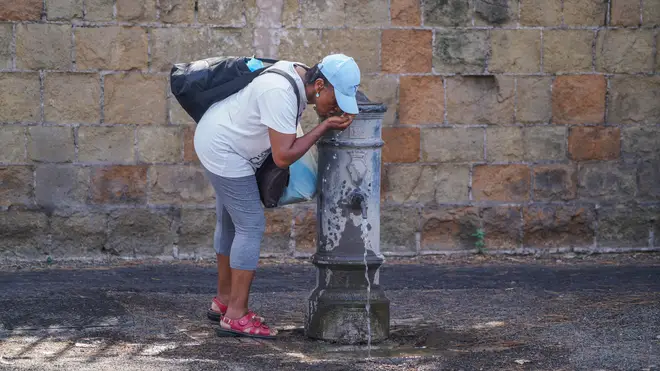
Ben Kentish 10pm - 1am
18 July 2023, 01:10 | Updated: 18 July 2023, 07:04

Brits have begun cancelling their holidays in Europe as the Charon heatwave sweeps the continent, with some tourists forced to flee from raging wildfires.
The scorching heatwave taking over Europe reached extreme highs of 44.8C in Spain on Monday, while seaside holiday resorts in Greece had to be evacuated due to wildfires.
Tourists have collapsed and fainted in Italy and Greece, and fires hit La Palma and Turkey in the past week as temperatures reached 43C.
And now Brits planning to enjoy their summer abroad are beginning to rethink their plans, instead opting for staycations to avoid the extreme conditions in popular holiday spots across Europe.
One person tweeted: "Me and mum are meant to be going to Spain in September, which meant leaving our little dog in kennels for the week!
"We have just decided to cancel our holiday, and the three of us are going to Cornwall instead. We have never been I am actually more excited about this than Spain."
Another tweet read: "Judging by the weather today, glad that I cancelled my holiday that was originally booked for late July."
A third person added: "Anyone going there now must be mad! I’d rather cancel my holiday than risk ending up in hospital."
Paola Deitan, 29, was planning to travel with a friend to Greece but has changed her trip to Barcelona instead.
"I am worried about my health. I don't want anything to happen to me while on holiday," she told the Observer.
Read more: El Niño returns: Rare weather event behind scorching temperatures set to hit UK

Forecasters believed the searing temperatures could surpass 48C in Italy with records potentially due to be broken in Spain and Greece too.
The World Meteorological Organization said on Monday: "The heat is forecast to intensify by the middle of the week (19 July) in parts of the Mediterranean, including Greece and Turkey.
"A further continuation into August is likely."
In Madrid, road cleaning services have been suspended and homeless people are being given shelter to cope with the temperatures.
On the Spanish island of La Palma in the Canaries, at least 4,000 people had to be evacuated as a forest fire burned out of control following a heatwave, authorities said.
The Acropolis in Greece is now closed during the hottest parts of the day - as temperatures are set to rise to 41C. Health officials in Italy have issued red weather warnings.

Europe's highest recorded temperature of 48.8C, registered in Sicily two years ago, could be exceeded in coming days, meteorologists have said.
Temperatures continue to climb to record-breaking levels across the globe, with the US and China seeing the mercury crossing 50C on Sunday.
Italy has issued red alerts for 16 cities as the north African weather event moves towards the Mediterranean region.
“We need to prepare for a severe heat storm that, day after day, will blanket the whole country,” an Italian weather news service said.
“In some places ancient heat records will be broken.”
It comes after China reported hitting temperatures of 52.2C on Sunday, overriding its previous record of 50.3C.

Meanwhile parts of the US have been predicted to reach 46C and a man in Arizona is thought to have died of heat-related causes.
The man, believed to be in his 70s, went on a bike ride in Buckeye desert on Sunday afternoon when he got a flat tyre and so called his wife asking her to pick him up – but when she arrived at their agreed spot he was nowhere to be found.
His wife later called the police and after searching the desert they found her husband dead, which the authorities believed was caused by heat.
Temperatures are predicted to soar above 45C in parts of Spain, Italy and Greece amid Charon’s arrival in Europe.

Parts of Spain have developed into wildfires as a result of the extreme heat, forcing more thousands of residents of La Palma to be evacuated.
Prof Simon Lewis, Chair of Global Change Science, at University College London, said: “This is just the beginning. This is what the climate system can do at just 1.2 degrees C warming. Current policies globally have us hitting 2.7 degrees C warming by 2100. That's truly terrifying.
“As scientists agreed last year: There is a rapidly closing window of opportunity to secure a liveable and sustainable future for all.
“Deep, rapid and sustained cuts in carbon emissions to net zero can halt the warming, but humanity will have to adapt to even more severe heatwaves in the future.”

Meanwhile Gareth Redmond-King, Head of International Programme at the Energy and Climate Intelligence Unit (ECIU), said: “These extremes are dangerous; last year’s record heat claimed almost 3,500 lives in the UK alone.”
About 42% of European land is currently experiencing drought, according to the European Drought Observatory (EDO). This increases the risk of wildfires and crop failure.


It comes after the world experienced its hottest ever week on record earlier this month.
The UN agency has warned that there is a 90% probability the El Niño could continue until the end of the year, although Charon is expected to last until the end of July.
El Nino is a weather event that occurs between every two to seven years as the Pacific Ocean warms up and charges parts of the atmosphere.